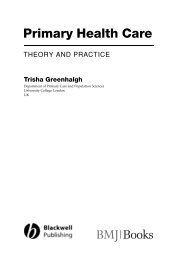Download File - JOHN J. HADDAD, Ph.D.
Download File - JOHN J. HADDAD, Ph.D.
Download File - JOHN J. HADDAD, Ph.D.
You also want an ePaper? Increase the reach of your titles
YUMPU automatically turns print PDFs into web optimized ePapers that Google loves.
Personalized Cancer Vaccines 71<br />
patients’ own cancers. Pramod Srivastava, Professor of Immunology and<br />
Director of the University of Connecticut Cancer Center explains, “A cancer cell<br />
can host millions of mutant peptides. Each time a cell divides, it probably has<br />
about somewhere between 6 and 60 mutations” (16).<br />
The personalized vaccines have the opportunity to present to the host<br />
immune system the entire repertoire of the mutated peptides (antigens capable of<br />
triggering immune system response) resulted from the degradation of encoded<br />
proteins. The vaccines prepared from patient’s own tumor have the advantage of<br />
possibly being more immunogenic, exposing the host immune system to a perceived<br />
“foreign” large number of muted peptides including those antigens that<br />
researchers have not yet recognized.<br />
Another approach in personalized cancer vaccines is the dendritic cell–<br />
based therapy. Patient’s dendritic cells (DC) are stimulated ex vivo through<br />
exposure to tumor-cell lysate, fusion with tumor cells, infected by virus containing<br />
a gene or exposure to purified peptides. A single or a few peptides from<br />
cancer-specific antigens can be used to pulse the patient’s own DC. Given back<br />
to the patient, DC will present the tumor antigens to the T cells in the effector<br />
arm of the immune system (17).<br />
In contrast to personalized vaccines using patient’s own tumor to derive a<br />
large repertoire of antigens that DC load in vivo, DC vaccines are using patient’s<br />
own blood to process autologous DC that are loaded in the laboratory with<br />
allogeneic tumor antigens expressed by the majority of tumors in a given type of<br />
cancer or on a variety of cancers.<br />
Whether they are based on cancer cells, purified proteins, or live immune<br />
cells, most therapeutic cancer vaccines generally aim to activate the branch of<br />
the immune system that can directly target and specifically kill cancer cells.<br />
Therapeutic cancer vaccines are based on the principle that, given the right<br />
conditions, the human immune system is capable of generating an effective<br />
antitumor immune response.<br />
CLINICAL DATA IN PERSONALIZED CANCER VACCINES THAT<br />
REACHED PHASE 3 CLINICAL TRIALS<br />
One of the shared and clear advantages to cancer vaccines is the excellent safety<br />
profile, which makes their use in the adjuvant or earlier-stage disease setting<br />
more suitable than more conventional treatments such as chemotherapy.<br />
Choudhury et al. note that “collectively the data indicate that vaccine therapy is<br />
safe, and no significant autoimmune reactions are observed even on long-term<br />
follow-up” (18). Such a safety profile would indicate the potential for a high<br />
quality of life index, which is a unique feature when measured against the<br />
adverse effects associated with traditional cancer treatments.<br />
Despite a general consensus that cancer vaccines appear to be safe and<br />
well tolerated, it is more difficult to draw conclusions regarding their efficacy.<br />
To date, there have only been approximately 25 randomized phase 2 or 3 trials

















